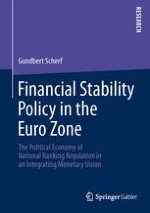2014 | OriginalPaper | Buchkapitel
4. International cooperation or race to the bottom? Banking regulation in an integrating financial market
verfasst von : Gundbert Scherf
Erschienen in: Financial Stability Policy in the Euro Zone
Verlag: Springer Fachmedien Wiesbaden
Aktivieren Sie unsere intelligente Suche, um passende Fachinhalte oder Patente zu finden.
Wählen Sie Textabschnitte aus um mit Künstlicher Intelligenz passenden Patente zu finden. powered by
Markieren Sie Textabschnitte, um KI-gestützt weitere passende Inhalte zu finden. powered by
